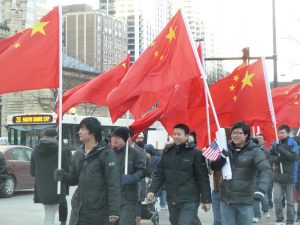A U.S. Justice Department (DOJ) statement on September 21 notes that the federal government has charged a New York City Police Department officer with acting as an “illegal agent” of China, along with a host of other crimes involving wire fraud, making false statements, and obstructing an official proceeding. The officer, 33-year old Baimadajie Angwang, is also a U.S. Army reservist and works in the NYPD’s community affairs unit. A naturalized U.S. citizen of Tibetan ethnicity who was — before his naturalization — a Chinese national, Angwang was arrested in Williston Park in New York’s Nassau County, according to the DOJ statement.
The statement quotes U.S. Assistant Attorney General for National Security John C. Demers as stating that “[a]ccording to the allegations, the Chinese government recruited and directed a U.S. citizen and member of our nation’s largest law enforcement department to further its intelligence gathering and repression of Chinese abroad.” The DOJ statement has claimed that since 2014, Angwang has acted on behalf of the Chinese Consulate in New York, including an official there affiliated with the United Front Work Department.
It claims “Angwang reported on the activities of Chinese citizens in the New York area, spotted and assessed potential intelligence sources within the Tibetan community in New York and elsewhere, and provided PRC officials with access to senior NYPD officials through invitations to official events.” If convicted, he faces a prison term of up to 55 years. According to the DOJ statement, Angwang had “close and continuing contacts” with family members in China, some of whom are “affiliated” with the People’s Liberation Army – facts he did not disclose while obtaining a security clearance to serve as a U.S. Army reservist.
Angwang’s arrest comes amid global scrutiny of Chinese intelligence operations, often using Chinese diaspora and targeting the Tibetan community across the world. On September 14, Indian authorities arrested an Indian journalist in New Delhi on charges of spying for China alleging that, among other activities, the arrestee had passed on information about the Dalai Lama.
Globally, the Chinese Communist Party (CCP) has – through “Overseas China (OC) Affairs” program – sought to keep a tight leash on foreign nationals of Chinese ethnicity (or, in this case, Tibetan), but also use them to advance CCP goals. In his 2018 book, Clive Hamilton quotes New Zealand academic James To’s doctoral dissertation, which notes that the program is “a massive operation involving incorporation and cooptation of the OC at every level of society, and managing their behavior and perceptions through incentives or disincentives to suit the situation and structural circumstances that the CCP desires.”
Though the extent to which pro-Beijing Tibetans are involved in United Front activities in Western democracies is not known in great detail, there are hints. In April last year, the pro-CCP Tibetan Association of Canada (TAOC) held its inaugural celebrations in Toronto which saw the participation of several Canadian politicians. However, as analyst J. Michael Cole pointed out in his piece on the event, there are several signs that the TAOC is a United Front organization.
The year before, in April 2018, Sweden indicted a Tibetan in that country on charges of espionage committed on behalf of China, a case the International Campaign for Tibet noted to be the “first known case of a Western government bringing criminal charges against a Tibetan accused of espionage.”
It has been estimated that there are between 5,000 and 6,000 Tibetans living in New York.
Angwang’s arrest comes at a time when the U.S. government is pushing back against foreign influence operations (partly a function of the intensified U.S.-China competition) and the DOJ is seeking to stringently enforce the 1938 Foreign Agents Registration Act (FARA) and related statutes. The first charge against Angwang is through a FARA related statute.
FARA statutes requires that certain individuals affiliated with, or representing the interests of, foreign powers and political interests register themselves with — and report their activities to — the DOJ. Late last month, the U.S. wing of the Overseas Friends of the BJP (India’s ruling party) registered with the DOJ under FARA. On September 17, a branch of the Qatar-based Al Jazeera media network was ordered by the DOJ to register under that Act’s provision.

































